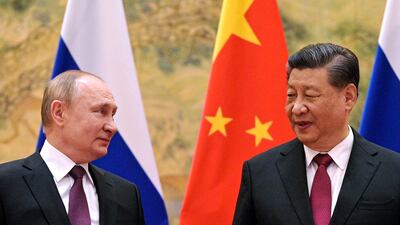Today’s visit by Chinese President Xi Jinping to Russia is taking place amid some extraordinary regional and global developments that have turned the spotlight on Beijing’s growing diplomatic influence, particularly regarding the war in Ukraine.
But while the war, dialogue between Saudi Arabia and Iran, plus tentative steps between Turkey and Egypt to mend bridges are all significant events that are reshaping the Middle East and Europe, China has been developing its distinct ideas for a different kind of international order for years.
The Community of Common Destiny, widely regarded as an important foreign-policy and diplomatic concept, was incorporated into the preamble to China’s constitution in 2018 and reflected Beijing’s desire for an international order not shaped by western predominance. The CCD possessed several elements but among them was a focus on equal partnership, revealing a vision for a more multi-polar world.
More major proposals followed – the Global Development Initiative and the Global Security Initiative were put forward by Mr Xi in 2021 and 2022 respectively. Speaking last week, Mr Xi discussed China’s latest diplomatic offering – the Global Civilisation Initiative. This, according to an official report, “will inject fresh and strong energy into the common development and progress of human society in a world fraught with multiple challenges and crises”.

Among those crises is Ukraine, and the world will be playing close attention as the Chinese leader engages with Russian President Vladimir Putin at a time when the international community has largely lined up in different camps according to which side they support in the war, as well as those who have remained neutral.
China’s approach has been to avoid apportioning blame, and Mr Xi’s government remains capable of holding meaningful talks with the Russian and Ukrainian leaderships. Beijing has been using its considerable political and economic prominence – as well as centuries of accumulated statecraft – to try to prevent the war from spiralling out of control, as evidenced by its 12-point plan to end the conflict issued in February.
As the fighting grinds on, seemingly outside of the international community’s ability to stop it, China’s role as a broker becomes more important. Even if the war was to end tomorrow, Europe, the US and Russia will remain miles apart politically and diplomatically – an influential country such as China may be indispensable as a mediator for a long time to come.
In the Middle East too, Beijing’s diplomacy is becoming more visible, growing in tandem with its economic influence. China, with no major military bases in the region and a pluralistic approach to relationships in the Middle East, has used the flexibility of its independent status to broker the recent tentative agreement between Riyadh and Tehran.
This growing diplomatic and foreign policy profile cannot be disconnected from China’s global economic ambitions. This year is the 10th anniversary of the Belt and Road Initiative, described in Chinese media yesterday as “another public good which has brought tangible benefits to people of participating countries and promoted people-to-people exchanges”. This important logistical, financial and economic network lends weight to Beijing’s diplomacy that cannot be ignored.
Whether this week’s talks between Mr Xi and Mr Putin move the Ukraine conflict one step closer to ending can only be guessed at. But what is clear is that Beijing has plenty to say about events far removed from its geographical neighbourhood. The world would do well to pay attention.


